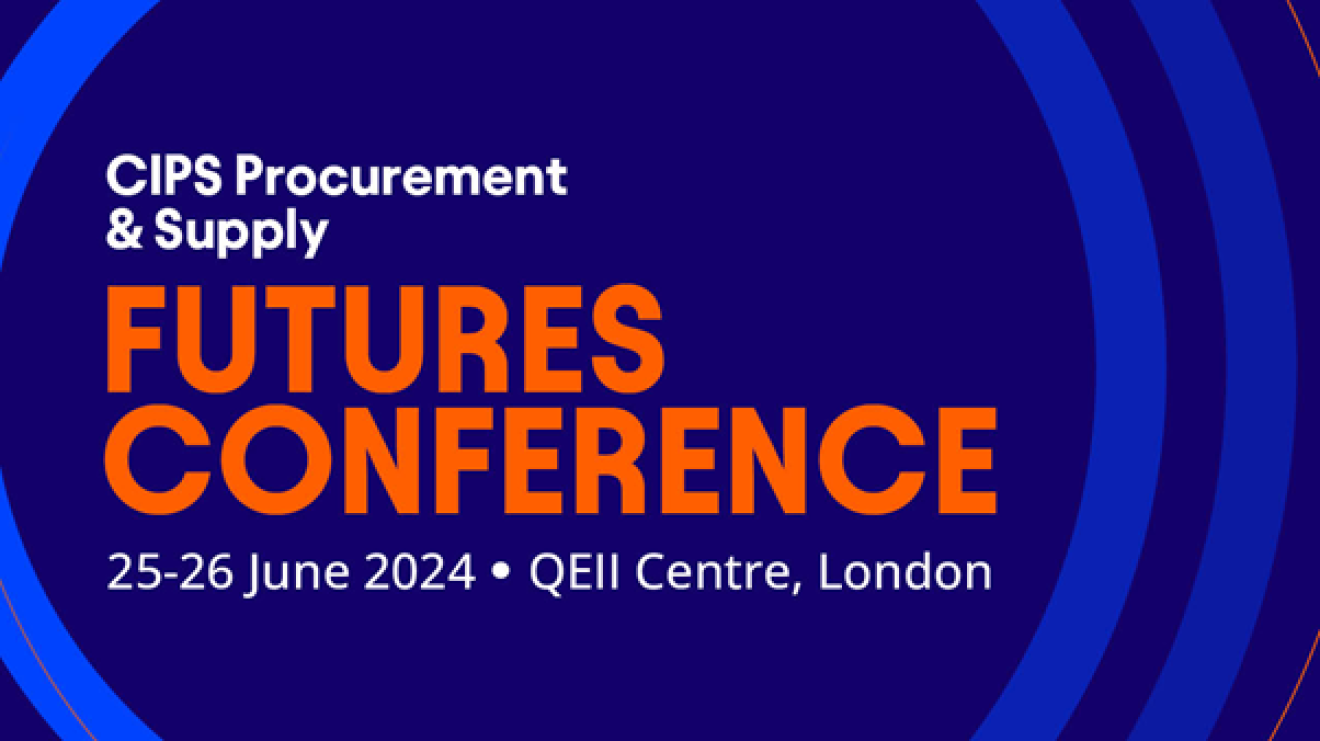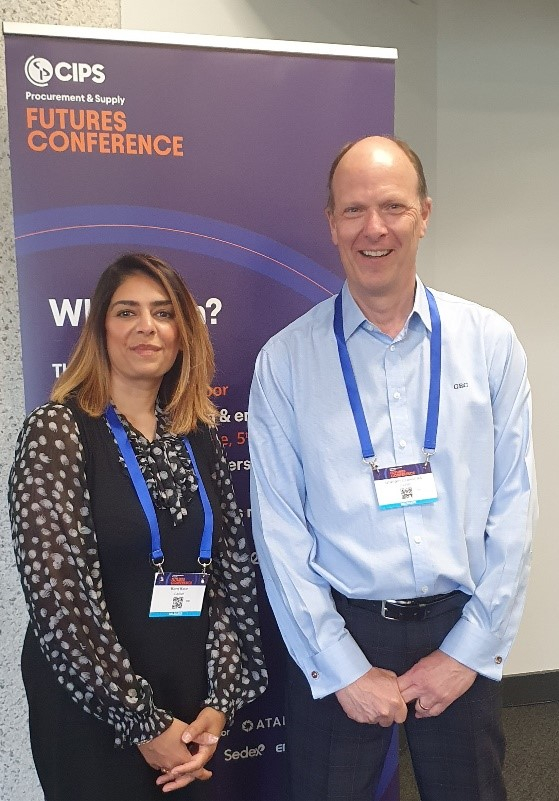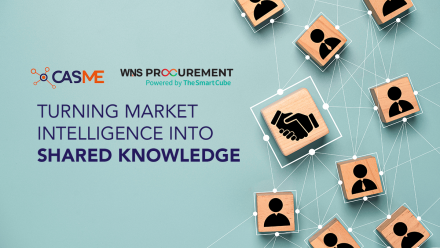
The CIPS Futures Conference 2024 brought together industry leaders and professionals to discuss the evolving Procurement landscape. Over two days at the end of June, the conference explored various themes central to modern Procurement practices.
In attendance from CASME were Graham Crawshaw, Procurement Content Director, and Kam Kaur, Business Development Manager EMEA. Read on to discover their summary of the discussions, providing a comprehensive overview of the key themes:
- Future trends affecting supply chains
- Influence and leadership
- Data and technology integration
- Sustainability and ESG focus
- Managing disasters and geopolitical challenges.

Future Trends Affecting Supply Chains
Throughout the conference, industry experts provided perspectives on anticipated trends and challenges in supply chain management over the next 12 months.
Internal challenges
- Increased digitalisation: Adoption of advanced digital tools and technologies to enhance supply chain efficiency and transparency.
- AI and automation: Expanding the role of AI in data analysis, supplier management, and process automation.
- Data quality and integration: Ensuring the accuracy and completeness of data used for AI and other digital tools.
- Sustainability focus: Continued emphasis on sustainable practices, including reducing carbon footprints and ethical sourcing.
- Talent development: Addressing the skills gap in the procurement profession by investing in training and professional development.
Supply chain issues
- Supply chain visibility: Greater demand for real-time visibility into supply chain operations.
- Supply chain disruptions: Managing disruptions caused by environmental events, such as natural disasters and climate change.
- Risk management: Enhanced focus on building resilient supply chains capable of withstanding disruptions.
External challenges
- Cybersecurity concerns: Addressing the growing threat of cyberattacks on digital supply chain systems.
- Economic pressures: Coping with inflationary pressures and fluctuating energy costs
- Geopolitical instability: Navigating the complexities of geopolitical tensions that may impact supply chain operations.
- Collaboration between sectors: Increased collaboration between public and private sectors to address common challenges and leverage shared resources.
Influence and Leadership
In today’s ever-changing procurement environment, the ability to influence far exceeds the importance of traditional hierarchical structures. Effective leaders inspire, strategise and empower their teams, creating environments where authority is both understood and respected.
Key skills to inspire and influence
Achieving objectives in procurement requires leaders to move beyond the outdated command-and-control methods, and adapt their approach to align with the preferences of individual team members. Communicating a clear vision to stakeholders through compelling, data-driven storytelling is crucial for establishing and maintaining a strong brand and instilling confidence in procurement operations.
Developing and leading teams
The significance of effective team dynamics cannot be overstated. Successful leaders recognise the important role of mentoring, trust, and empowerment. Understanding the power dynamics within an organisation is essential; effective leaders identify key influencers and decision-makers. By investing in allies, promoting collaboration, and demonstrating deep subject matter expertise, leaders can enhance team performance and build trust within the organisation.
Data and Technology Integration
Artificial intelligence (AI) is instrumental in addressing persistent data challenges, ensuring decisions are based on accurate insights and enhancing overall efficiency by swiftly analysing vast amounts of data.
AI's role in Procurement
AI-driven analytics provide deeper insights into procurement activities, supplier performance, and market trends by identifying patterns and anomalies not discernible through traditional methods, allowing for proactive, informed decision-making.
Practical Applications for AI
Enhanced operations
AI enhances supplier management by automating tasks and providing real-time data analysis, improving relationships and ensuring compliance with contractual obligations. Predictive analytics forecasts supplier performance and potential risks, enabling better supplier selection and risk mitigation strategies.
It also automates procurement processes such as order processing and contract management, reducing errors and freeing up time for strategic initiatives. In inventory management, AI predicts demand and optimises stock levels to reduce costs and improve supply chain efficiency.
Sustainability impact
AI optimises supply chains for sustainability by identifying inefficiencies, improving resource utilisation, and reducing waste, thereby benefiting the environment while enhancing cost savings and brand reputation.
Key Considerations
Embrace technological advancements
Procurement professionals must embrace AI and other digital innovations to remain competitive and enhance efficiency. This necessitates a commitment to continuous learning and adaptation to new technologies.
Ensure data integrity
High-quality data is necessary for effective AI implementation. Procurement teams should prioritise data accuracy and completeness, investing in robust data management systems and practices to maximise AI's effectiveness.
Strategic implementation
AI implementation should be strategic, focusing on areas with significant benefits such as supplier management, process automation, and inventory optimisation. A phased approach to AI adoption allows organisations to gradually build their capabilities and address any challenges that arise.
Sustainability and ESG Focus
Sustainability, and environmental, social and governance (ESG) factors are non-negotiable in modern procurement.
Importance of sustainable practices
Making progress in sustainability requires robust procurement processes and resolved data issues. Sustainable practices must also be cost-effective and commercially viable.
Ethical sourcing and environmental impact
The emphasis is on prioritising the reduction of carbon footprints, ensuring ethical sourcing, and promoting diversity in supplier selection. Transparency has emerged as a powerful tool, with a growing need to address the environmental impact of supply chains and advocate for ethical operations.
Job creation
Sustainable procurement can generate job opportunities and economic growth, proving its broader impact beyond environmental benefits. Many of today’s graduates prioritise sustainability and ESG as core principles, and this shift in values will increasingly influence personal choices and organisational branding.
AI
Artificial intelligence can significantly enhance sustainability efforts by analysing ESG-related data, enabling organisations to track and improve their sustainability performance. AI-driven insights can help identify opportunities to reduce carbon footprints and improve ethical sourcing practices.
Managing Disasters and Geopolitical Challenges
Navigating complexities with adaptability and resilience
Procurement must skilfully navigate geopolitical factors that often lead to shortages and heightened operational intensity. Effective disaster management and strategic thinking are crucial for mitigating these risks. In these uncertain times, resilience, adaptability and responsiveness are essential, enabling teams to be flexible and ready to adjust to changing circumstances. Procurement professionals must be prepared to lead through uncertainty, ensuring their teams remain resilient and responsive.
In summary
The CIPS Futures Conference 2024 emphasised the importance of digital innovation, AI, and sustainable practices in modernising procurement. Key discussions highlighted the need for greater adoption of these technologies and robust cybersecurity to tackle current and future challenges. Procurement professionals are encouraged to apply these insights to achieve strategic improvements within their organisations.
See what’s happening in your CIPS region.
Back to News



